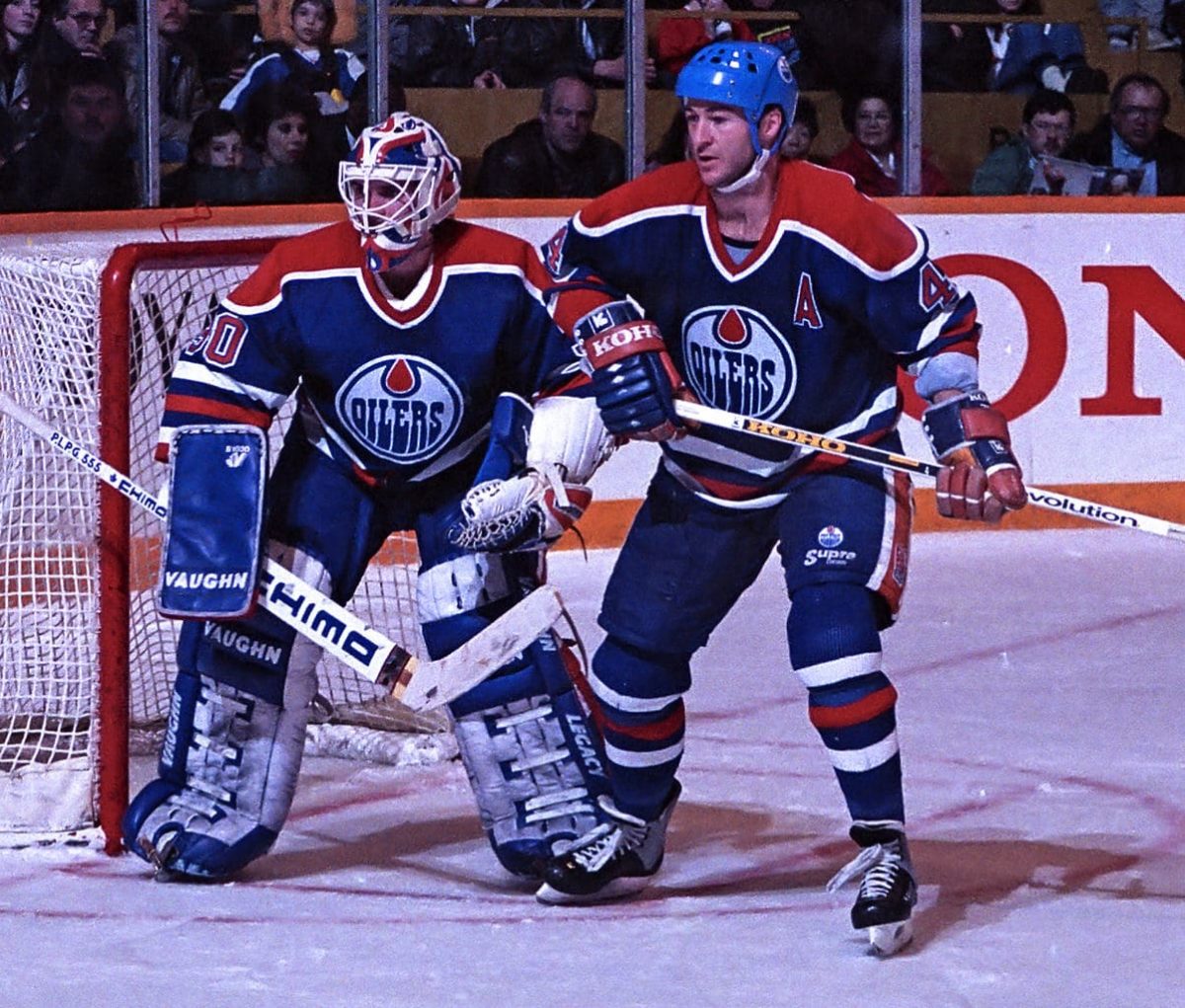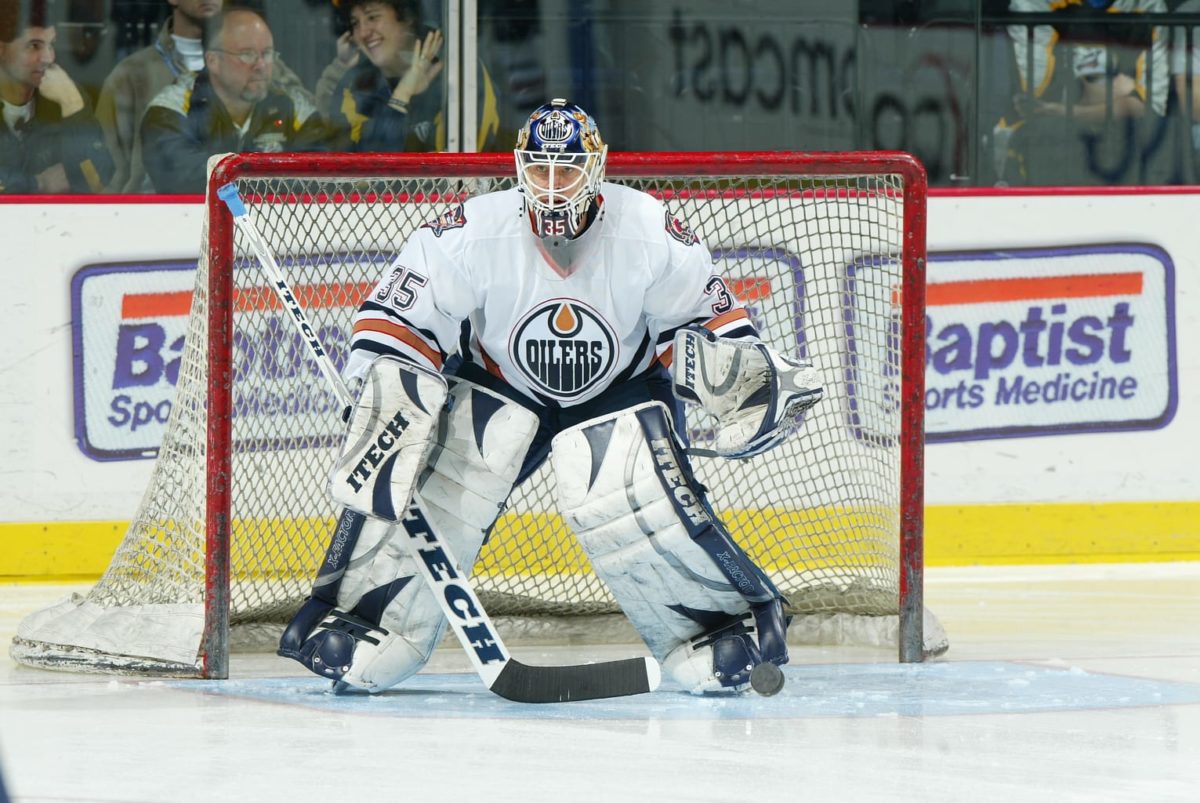Curtis Joseph’s Edmonton Oilers debut, on Jan. 13, 1996, was a transformative moment for the franchise.
Likewise, his exit from Edmonton, coming exactly two and a half years later, on July 15, 1998, was an earth-shaking event for the Oilers.
On the 25th anniversary of Joseph playing his first game with the Oilers, we explored how it marked Edmonton’s ascension from the bottom of the standings back toward the playoffs, helping to re-engage fans at a pivotal moment in franchise history.
And now on the 25th anniversary of Joseph signing with the Toronto Maple Leafs, we explore how it epitomized Edmonton’s plight as a small market team who could have nice things only up to a certain point.
The Joseph Years
The man they called CuJo was in Edmonton for a good time but not a long time. He joined the team midway through 1995-96, when the Oilers were on their way to missing the postseason for a fourth straight year, and was gone following the 1997-98 season, but in each of his two full seasons, he backstopped Edmonton into the playoffs and then to a monumental first-round upset victory.

With the exception of Chris Pronger, there might not be another player who had as great of an impact on the Oilers in such a short Edmonton tenure.
In 177 regular season games with the Oilers, Joseph had a record of 76-76-20 with a goals-against average (GAA) of 2.90 and a .902 save percentage (SV%). His 14 shutouts were at the time the most in franchise history and today rank second behind only Tommy Salo’s 23.
Joseph was lights-out in the playoffs, with a 2.39 GAA and a .919 SV%. He is the all-time franchise leader for playoff shutouts, with five in only 24 postseason games as an Oiler.
Joseph Propels Edmonton Up the Standings
After qualifying for the playoffs in 13 straight years going back to their inaugural NHL season, a run that included five Stanley Cup victories and only three first-round exits, the Oilers tumbled down the standings in 1992-93 and began a full-scale rebuild.
Edmonton began assembling a nucleus of talented young skaters, led by All-Star center Doug Weight. But the Oilers couldn’t keep the puck out of their net; in 1992-93 and 1993-94, they allowed the fifth-most goals in the NHL; in 1994-95, no team was scored on more often.
Goaltender Bill Ranford started more than three-quarters of the games for Edmonton over those three seasons, and while he was no slouch (he did win the Conn Smythe Trophy in 1990, after all), Ranford wasn’t quite good enough to lift a team from the outskirts of the playoffs to a spot in the postseason dance. If the Oilers were going to take that next step, they needed better goaltending. And Joseph was the man to provide it.

Edmonton had acquired the rights to Joseph on Aug. 4, 1995, via trade with the St. Louis Blues, but Oilers general manager Glen Sather initially wasn’t able to come to terms on a contract with the restricted free agent netminder, who spent the first half of 1995-96 playing in the International Hockey League with the Las Vegas Thunder. Finally, on Jan. 11, 1996, Sather signed Joseph to a three-year contract worth a total of $6.9 million and dealt Ranford to the Boston Bruins.
While the Oilers had a 3.93 GAA, third-worst in the NHL, in 43 games prior to Ranford being traded, Edmonton saw its GAA drop to 3.46 in the final 39 games following Joseph’s signing. The Oilers then posted a GAA of 3.01 in 1996-97 and 2.73 in 1997-98, eighth and seventh-best, respectively, in the Western Conference. That was good enough to help the Oilers get back in the playoffs as the Western Conference’s seventh seed in both years.
The postseason is when an elite goaltender can make the greatest difference, and Joseph did just that. In Edmonton’s 4-3 1997 quarter-final victory over the Dallas Stars, he recorded two shutouts and made the most iconic save in franchise history, robbing Dallas star forward Joe Nieuwendyk in overtime of Game 7 just moments before Todd Marchant scored the series-winning goal.
Related: Revisiting the Oilers’ Stunning 1998 Playoff Upset of the Avalanche
Against the Colorado Avalanche in the 1998 quarter-finals, Joseph did not allow a goal over the final 163:40 of the series as Edmonton rallied from a 3-1 deficit to win it in seven games.
Sather Takes Gamble
Sather faced a tough decision as Edmonton hit the 1998 Trade Deadline sitting at eighth in the Western Conference standings, three points ahead of the ninth-place San Jose Sharks for the last playoff position. Edmonton had 11 games remaining on its schedule, while the Sharks had 13 games left to play.
Joseph was in the final year of his contract and set to become an unrestricted free agent with a massive pay raise, one that the small-market Oilers simply would not be able to afford.
Should Sather trade Joseph, ensuring Edmonton got something in return for the superstar goalie rather than losing him for nothing in free agency? Or should Sather keep Joseph to give the Oilers a chance at a playoff run?
If you asked fans that question during the spring of 1998, when the Oilers won six of their final seven games to reach the postseason and then treated Edmonton to a magical four weeks comprising two playoff rounds, they’d tell you yes. But if you asked them that question just a couple of months later, when Joseph signed a four-year, $24 million contract with the Leafs and the cruel reality of a future without an elite goalie became real, their answer might have been a lot different.
Oilers Face Life Without Joseph
With a roster that featured Mike Grier, Bill Guerin, Roman Hamrlik, Janne Niinimaa, Marchant, Ryan Smyth and Weight all aged 27 and under, the 1998 Oilers certainly looked like a team on the cusp of the NHL’s upper echelon. Over their final 40 games of the regular season, they had the highest point percentage (.613) in the Western Conference, and in the postseason knocked off the No. 2 seed Avs before bowing out to the No. 1 seed Stars in five hard-fought games.
But when they lost Joseph, the Oilers lost their most essential component. The team was back to where it was three years prior, without a calibre of netminder that was needed to truly contend for the Stanley Cup.
Beginning 1998-99 with the goaltending tandem of Bob Essensa and Mikhail Shtalenkov—both who could be classified as elite backups and mediocre starters—the Oilers scratched and clawed. Eventually, a couple of days before the trade deadline on March 23, 1999, Edmonton acquired Tommy Salo from the New York Islanders, and the Swedish goalie helped spark a late-season surge that got the Oilers into the playoffs as the eighth seed. Unfortunately, they were swept in the first round by the Stars.
The Salo Years
The 6-foot Salo was a pretty good goaltender. He even represented Edmonton twice in the NHL All-Star Game. But he wasn’t Joseph.
Salo spent parts of six seasons in Edmonton, 1998-99 to 2003-04, during which the Oilers made the playoffs four times. But they never made it out of the first round. Salo had just five playoff victories in his Oilers tenure (half as many as Joseph in twice the time) and went 0-4 in games that Edmonton was facing elimination (Joseph won four times when the Oilers were in a do-or-die scenario).

With new GM Kevin Lowe at the helm, the Oilers acquired Guerin and Weight, in 2000 and 2001, respectively. Both moves were made prior to the star forwards becoming free agents that the Oilers couldn’t afford, ensuring that, unlike Joseph, there would at least be some return for Edmonton losing its top players.
From 1992-93 and 2003-04, Edmonton advanced past the opening round of the playoffs 100 percent of the time that Joseph was on the roster for the entire season, and zero percent of the time that he was not on the roster for the entire season. The Oilers didn’t win a playoff series again until 2005-06 when the aforementioned Pronger led Edmonton on a run to Game 7 of the Stanley Cup Final.
Joseph went on to play 10 more seasons in the NHL, retiring in 2010 with 445 career wins, the fourth-most in NHL history at the time (now seventh-most). The Oilers have had some good goalies in the last 25 years but no one at the level of Joseph. And Edmonton is still in search of its next Stanley Cup.